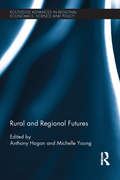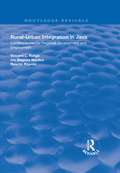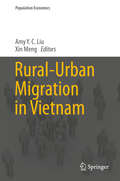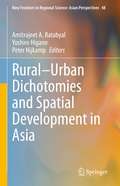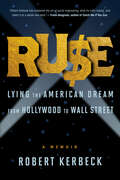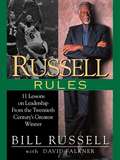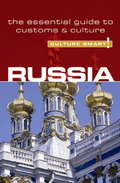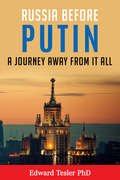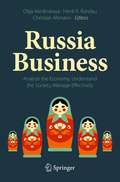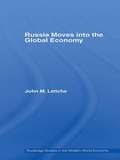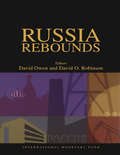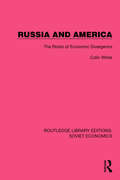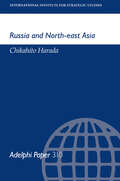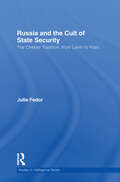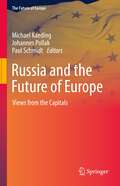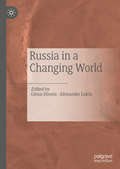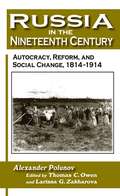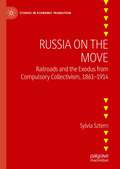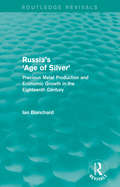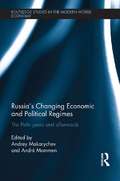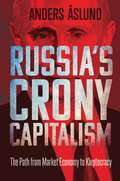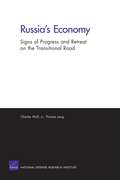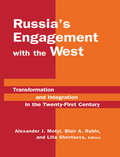- Table View
- List View
Rural and Regional Futures (Routledge Advances in Regional Economics, Science and Policy)
by Michelle Young Anthony HoganAgriculture, mining and related rural industries have been central to the development of Australia’s economy. This book details the role that the Australian Government has played in the making of rural and regional Australia, particularly since World War II. The book reviews these policies and evaluates them with regards the commitments undertaken by the Government to contribute towards vibrant, rural communities. Policy areas addressed include agriculture, water, education, welfare and population, natural resource management, resource extraction, Indigenous and affairs, localism, rural research and regional innovation, Youth Affairs and the devolution of regional governance. Overall two distinct policy strategies can be observed: one wherein the government saw its role as part of the entrepreneurial state and a sector wherein government has increasingly taken itself out of industry development, leaving this role to the market. Having considered these strategies and their impacts, the book concludes that policy over the past 40 years has not in fact contributed to a more vibrant, prosperous rural and regional Australia. Rural and Regional Futures concludes with several chapters looking to the future. One chapter explores what the role of the state can be within a social market economy while the final chapter gives consideration to the initial steps rural communities will need to take to begin the process of revitalisation. While these materials present as a case study of developments in Australia, the policy shift from the Government as entrepreneur to a focus on markets is an international one and as such, the insights offered by this book will have wide appeal.
Rural-Urban Integration in Java: Consequences for Regional Development and Employemnt (Routledge Revivals)
by Vincent L. RotagéFirst published in 2000, this volume draws from the result of the fieldwork conducted in Yogyakarta Special Region in 1991 and 1992, with the aim of assessing the consequences of the strengthening of urban-rural linkages upon local development in five hinterland communities and an emphasis on employment issues – especially with regard to diversification of the economy. Vincent Rotgé, Ryanto Rijanta and Ida Bagoes explore issues including non-permanent migrations, piedmont and mountain communities and the transition from an agrarian to an urban society.
Rural-Urban Migration in Vietnam (Population Economics)
by Amy Y. Liu Xin MengThis edited volume provides a comprehensive overview of rural-urban migration in Vietnam. It addresses a wide range of important topics, including Vietnam’s household registration system (ho khau), migration trends, remittance behaviour and social networking. In addition, it examines migrants’ earnings, their children’s schooling, housing issues and their families’ consumption behaviour in their destination cities.The book is mainly based on new data from the Australian National University's ‘Study of Rural-Urban Migration in Vietnam with Insights from China and Indonesia’ (VRUM) project, which identifies migrants from the large-scale, representative ‘Vietnam Household Living Standards Survey’ 2012 (VHLSS2012). In addition to the data from the VRUM project, the book draws on other widely used data sources to provide a comprehensive picture of rural-urban migrants in Vietnam.By highlighting the issues and challenges brought about by the large-scale rural-urban migration in Vietnam, the book helps researchers and policymakers more effectively formulate policies to respond to those challenges. Moreover, Vietnam’s experience can serve as lessons learnt to other transitional/developing countries.
Rural–Urban Dichotomies and Spatial Development in Asia (New Frontiers in Regional Science: Asian Perspectives #48)
by Peter Nijkamp Amitrajeet A. Batabyal Yoshiro HiganoThis edited book brings together in one place new studies of rural–urban interactions and their implications for regional growth and development in different regions within Asia. Specifically, the individual chapters in the book shed light on the different kinds of rural–urban interactions that we witness in Asian regions, particularly those that are based on migration, poverty, inequality, education, economic dependence, and the flow of goods and services. The book departs from the existing literature in three ways. First, it explicitly recognizes that different kinds of rural–urban interactions have dissimilar impacts on the lives and hence on the welfare of the residents of rural and urban regions. Second, the book emphasizes the varied spatial and temporal dimensions of the interactions and the ways in which these dimensions influence rural and urban societies. Third, this book demonstrates the ways in which an understanding of the preceding two points contributes to our knowledge about economic growth and development. Because Asia is the fastest-growing and most dynamic continent in the world today, the research delineated in the individual chapters of the book provides practical guidance concerning two salient questions. First, how do we effectively address the economic development challenges stemming from the interactions between alternate rural and urban regions within Asia? Second, how do we ensure that the policies we design to address these challenges give rise to broad-based economic growth and development that is sustainable?
Ruse: Lying the American Dream from Hollywood to Wall Street
by Robert Kerbeck&“Kerbeck&’s juicy memoir tells riveting tales [with] the thrill of a spy novel. . . Kerbeck bares all of his wild business secrets within the world of corporate espionage&” --Foreword Reviews"Robert Kerbeck has mastered the art of social engineering, or what he calls 'rusing', and taken it to a whole new level." —Frank Abagnale, author of Catch Me If You Can B-list actor, A-list corporate spyIn the world of high finance, multibillion-dollar Wall Street banks greedily guard their secrets. Enter Robert Kerbeck, a working actor who made his real money lying on the phone, charming people into revealing their employers&’ most valuable information. In this exhilarating memoir that will appeal to fans of The Wolf of Wall Street and Catch Me If You Can, unsuspecting receptionists, assistants, and bigshot executives all fall victim to &“the Ruse.&” After college, Kerbeck rushed to New York to try to make it as an actor. But to support himself, he&’d need a survival job, and before he knew it, while his pals were waiting tables, he began his apprenticeship as a corporate spy. As his acting career started to take off, he found himself hobnobbing with Hollywood luminaries: drinking with Paul Newman, taking J.Lo to a Dodgers game, touring E.R. sets with George Clooney. He even worked with O.J. Simpson the week before he became America&’s most notorious double murderer. Before long, however, his once promising acting career slowed while the corporate espionage business took off. The ruse job was supposed to have been temporary, but Kerbeck became one of the world&’s best practitioners of this deceptive—and illegal—trade. His income jumped from tens of thousands to hundreds of thousands to millions of dollars a year. Until the inevitable crash… Kerbeck shares the lies he told, the celebrities he screwed (and those who screwed him), the cons he ran, and the money he made—and lost—along the way.
Russell Rules: 11 lessons on leadership from the twentieth century's greatest winner
by Bill Russell David FalknerBOOKS ARE AVAILABLE AT QUANTITY DISCOUNTS WHEN USED TO PROMOTE PRODUCTS OR SERVICES. FOR INFORMATION PLEASE WRITE TO PREMIUM MARKETING DIVISION, PENGUIN PUTNAM INC., 375 HUDSON STREET, NEW YORK, NEW YORK 10014.
Russia - Culture Smart!
by Anna KingCulture Smart! provides essential information on attitudes, beliefs and behavior in different countries, ensuring that you arrive at your destination aware of basic manners, common courtesies, and sensitive issues. These concise guides tell you what to expect, how to behave, and how to establish a rapport with your hosts. This inside knowledge will enable you to steer clear of embarrassing gaffes and mistakes, feel confident in unfamiliar situations, and develop trust, friendships, and successful business relationships.Culture Smart! offers illuminating insights into the culture and society of a particular country. It will help you to turn your visit-whether on business or for pleasure-into a memorable and enriching experience. Contents include:* customs, values, and traditions* historical, religious, and political background* life at home* leisure, social, and cultural life* eating and drinking* do's, don'ts, and taboos* business practices* communication, spoken and unspoken"Culture Smart has come to the rescue of hapless travellers." Sunday Times Travel"... the perfect introduction to the weird, wonderful and downright odd quirks and customs of various countries." Global Travel"...full of fascinating-as well as common-sense-tips to help you avoid embarrassing faux pas." Observer"...as useful as they are entertaining." Easyjet Magazine"...offer glimpses into the psyche of a faraway world." New York Times
Russia Before Putin
by Edward TeslerThis is a book that is fascinating life about the realities of living in the Soviet Union by a man who was in some very interesting places when Josef Stalin and a few other dictators were running the place. Dr. Tesler has the unique skill of making a boring subject like economics fascinating. Someone reading this book will find that in his unique ability to economize on words, he can supply an abundance of incredible information. This is a book every student studying World History should read.This is not a book about Vladimir Putin but it is a book about the groundwork in which he functioned before he got involved in big time politics. The governmental seeds that were sown in Russia when Dr. Tesler was getting out of the Soviet Union may well be finding growth in Mr. Putin’s timberland in which he seemingly enjoys the hunt.
Russia Business: Analyze the Economy, Understand the Society, Manage Effectively
by Henk R. Randau Olga Medinskaya Christian AltmannA comprehensive guide in a compact format on doing business in Russia. This book contains everything business-minded individuals need to know, using practical information and numerous tips to succeed in Russia.‘Russia Business’ discusses the economy, highlights the challenges Russia would face after the Coronavirus crisis, and covers key societal topics. In addition, it gives a greater insight into the work culture, business regulation and provides first-hand advice on how to manage a business in Russia.This book covers topics of interest to business professionals looking to enter the Russian market, to grow their Russian operations, and to all managers who intend to update their knowledge about Russia in relevant business areas.
Russia Moves into the Global Economy (Routledge Studies In The Modern World Economy Ser.)
by John M. LeticheJohn M. Letiche is Professor Emeritus of Economics at the University of California, Berkeley
Russia Rebounds
by David Owen David O. RobinsonThis book analyses Russia's dramatic economic recovery since the country's financial crisis in 1998, with the focus on macroeconomic issues and fiscal and banking sector reforms. It considers the various factors underlying this recovery and highlights key policy challenges that will need to be addressed in order to ensure that the post-crisis recovery is sustained. Chapters look at macroeconomic policymaking; structural reforms and the growth outlook; tax and public expenditure reforms; the banking crisis and recovery; debt problems and the road from default to sustainability.
Russia and America: The Roots of Economic Divergence (Routledge Library Editions: Soviet Economics #11)
by Colin WhiteRussia and America (1987) examines the divergence between two countries organised on diametrically opposed economic principles – one centrally-planned, state-dominated, the other a highly decentralised market economy, free from significant government intervention. It highlights not the political changes brought about by the Russian revolution, but a longer more gradual process of interaction between physical and human environments. A comparative study extending over several centuries is used to account for the striking differences in their economic history.
Russia and China: Energy Relations and International Politics
by Rawi Abdelal Sogomon TarontsiRussia and China are neighbors with complementary needs: Russia has an abundance of energy resources, which China needs to fuel its industry. The case analyzes the evolution of the China-Russia energy relations in the post-Cold War period, with an emphasis on the political factors, external and domestic, impeding and contributing to the full realization of the potential of energy ties between Russia and China.
Russia and North-East Asia (Adelphi series)
by Chikahito HaradaRussia has recently strengthened its diplomatic relations with its North-East Asian neighbours - China, Japan, and North and South Korea. But without much more reform at home, Russia will be neither attractive as a partner nor live up to its full potential. Chikahito Harada assesses the reasons for Russia's policy towards North East Asia and offers key policy recommendations.
Russia and the Cult of State Security: The Chekist Tradition, From Lenin to Putin (Studies in Intelligence)
by Julie FedorThis book explores the mythology woven around the Soviet secret police and the Russian cult of state security that has emerged from it. Tracing the history of this mythology from the Soviet period through to its revival in contemporary post-Soviet Russia, the volume argues that successive Russian regimes have sponsored a ‘cult’ of state security, whereby security organs are held up as something to be worshipped. The book approaches the history of this cult as an ongoing struggle to legitimise and sacralise the Russian state security apparatus, and to negotiate its violent and dramatic past. It explores the ways in which, during the Soviet period, this mythology sought to make the existence of the most radically intrusive and powerful secret police in history appear ‘natural’. It also documents the contemporary post-Soviet re-emergence of the cult of state security, examining the ways in which elements of the old Soviet mythology have been revised and reclaimed as the cornerstone of a new state ideology. The Russian cult of state security is of ongoing contemporary relevance, and is crucial for understanding not only the tragedies of Russia’s twentieth-century history, but also the ambiguities of Russia’s post-Soviet transition, and the current struggle to define Russia’s national identity and future development. The book examines the ways in which contemporary Russian life continues to be shaped by the legacy of Soviet attitudes to state-society relations, as expressed in the reconstituted cult of state security. It investigates the shadow which the figure of the secret policeman continues to cast over Russia today. The book will be of great interest to students of modern Russian history and politics, intelligence studies and security studies, as well as readers with an interest in the KGB and its successors.
Russia and the Future of Europe: Views from the Capitals (The Future of Europe)
by Michael Kaeding Paul Schmidt Johannes PollakThis book sheds light on how Member States and EU neighbours relate to Russia. It includes their historical, financial and political ties, as well as the public perception of the national population vis-à-vis Russia. Each chapter builds on these factors to elucidate the country’s position towards Russia and provides a prediction on the future of these relations. This volume shows the diverse relations that the EU member states and neighbours have with Russia, spanning from tense and confrontational to more eased and friendly, highlighting the contrasts between the national state and the EU as a whole. The book also presents the reader with concrete aspects in different policy areas, via recommendations on how single countries and the EU should deal with Russia. Russia’s invasion of Ukraine on 23rd February 2022 will change the relationship between the West and Putin’s Russia for decades to come. No doubt that this blatant violation of International Law and the incomprehensible human suffering of Ukrainian citizens will massively change the attitude of the countries analysed in this book.
Russia in a Changing World
by Glenn Diesen Alexander LukinThis book explores Russia’s efforts towards both adapting to and shaping a world in transformation. Russia has been largely marginalized in the post-Cold War era and has struggled to find its place in the world, which means that the chaotic changes in the world present Russia with both threats and opportunities. The rapid shift in the international distribution of power and emergence of a multipolar world disrupts the existing order, although it also enables Russia to diversify it partnerships and restore balance. Adapting to these changes involves restructuring its economy and evolving the foreign policy. The crises in liberalism, environmental degradation, and challenge to state sovereignty undermine political and economic stability while also widening Russia’s room for diplomatic maneuvering. This book analyzes how Russia interprets these developments and its ability to implement the appropriate responses.
Russia in the Nineteenth Century: Autocracy, Reform, and Social Change, 1814-1914 (The\new Russian History Ser.)
by A. I. Polunov Thomas C. Owen L. G ZakharovaThis is a comprehensive interpretive history of Russia from the defeat of Napoleon to the eve of World War I. It is the first such work by a post-Soviet Russian scholar to appear in English. Drawing on the latest Russian and Western historical scholarship, Alexander Polunov examines the decay of the two central institutions of tsarist Russia: serfdom and autocracy. Polunov explains how the major social groups - the gentry, merchants, petty townspeople, peasants, and ethnic minorities - reacted to the Great Reforms, and why, despite the emergence of a civil society and capitalist institutions, a reformist, evolutionary path did not become an alternative to the Revolution of 1917. He provides detailed portraits of many tsarist bureaucrats and political reformers, complete with quotations from their writings, to explain how the principle of autocracy, although significantly weakened by the Great Reforms in mid-century, reasserted itself under the last two emperors. Polunov stresses the relevance, for Russians in the post-Soviet period, of issues that remained unresolved in the pre-Revolutionary period, such as the question of private property in land and the relationship between state regulation and private initiative in the economy.
Russia on the Move: Railroads and the Exodus from Compulsory Collectivism, 1861–1914 (Studies in Economic Transition)
by Sylvia SzternThis book explores the impact of railroads on 19thcentury Russian peasant collectivism. The mutual-insurance mechanism in a precarious agricultural environment, provided bya structured communal-village system predicated on the reputation and authorityof community norms,is exposed to rationalist exchange—occasioning an institutional adaptation process:the individualization of property rights in land. Spatial-mobility technology animated market integration, specialization, literacy,and human-capital acquisition among peasant wage workers who commuted from their villages.Temporarily rising transaction costs forced the Tsar to concede household property rights in land in the so-called Stolypin reform of 1906.This challenge to the imperial patrimony, powered by the railroads, steered late imperial Russia toward constitutional governance.The spatial-mobility technology gave peasants access to centers of agglomeration of knowledge, changedcognitive perceptions of distance, and reduced the uncertainty and opportunity costs of travel. The empirical findings in this monograph corroborate the conclusion that the railroads occasioned a cultural revolution in late imperial Russia and made Stalin unnecessary for the modernization of the Euro-asian giant. This book highlights the profound effect that the development of the railroads had on Russian economic and political institutions and practices. It will be of indispensable valueto students and researchers interested in transitional economics and economic history.
Russia's 'Age of Silver': Precious-Metal Production and Economic Growth in the Eighteenth Century (Routledge Revivals)
by Ian BlanchardFirst published in 1989, Russia’s ‘Age of Silver’ represents a major contribution to the history of the international economy during the eighteenth century, challenging old prejudices and establishing the importance of Russian precious-metal production. Ian Blanchard examines the nature of the Central and South America specie crisis of 1670 to 1760, and the response of European precious-metal producers. He highlights the rise of the Russian copper industry to a position of world supremacy, and the Siberian gold and silver mines to ‘old world’ supremacy. The study explains why Russia experienced little inflation and why no metal was exported: the economy acted as a sponge, absorbing the flood of coins as monetary expansion was paralleled by rapid economic growth. These developments doubled average per capita incomes over the course of the century, so that between 1788 and 1807 the average Russian enjoyed an income equivalent to that of their British counterpart. Providing a comprehensive analysis, this reissue will be of particular value to students and researchers with an interest in Russian economic history.
Russia's Changing Economic and Political Regimes: The Putin Years and Afterwards (Routledge Studies in the Modern World Economy)
by Andrey Makarychev André MommenThe book reveals the interconnection between social, cultural and political protest movements and social and economic changes in a post-communist country like Russia still dominated by bureaucratic rulers and "oligarchs" controlling all basic industries and mining activities. Those interests are also dominating Russia’s foreign policy and explain why Russia did not succeed in becoming an integral part of Europe. The latter is, at least, wished by many Russian citizens.
Russia's Crony Capitalism: The Path from Market Economy to Kleptocracy
by Anders AslundA penetrating look into the extreme plutocracy Vladimir Putin has created and its implications for Russia’s future This insightful study explores how the economic system Vladimir Putin has developed in Russia works to consolidate control over the country. By appointing his close associates as heads of state enterprises and by giving control of the FSB and the judiciary to his friends from the KGB, he has enriched his business friends from Saint Petersburg with preferential government deals. Thus, Putin has created a super wealthy and loyal plutocracy that owes its existence to authoritarianism. Much of this wealth has been hidden in offshore havens in the United States and the United Kingdom, where companies with anonymous owners and black money transfers are allowed to thrive. Though beneficial to a select few, this system has left Russia’s economy in untenable stagnation, which Putin has tried to mask through military might.
Russia's Economy: Signs of Progress and Retreat on the Transitional Road
by Thomas Lang Charles Wolf Jr.Sixteen years after the Soviet Union's demise, the Russian economy can still be appropriately characterized as transitional. The authors shed light on ambiguities surrounding this status through an exploration of four questions related to issues of interest to government decision-makers.
Russia's Engagement with the West: Transformation and Integration in the Twenty-First Century
by Lilia Shevtsova Alexander J. Motyl Blair A. RubleThe Putin and Bush presidencies, the 9/11 attack, and the war in Iraq have changed the dynamics of Russian-European-US relations and strained the Western alliance. Featuring contributions by leading experts in the field, this work is the first systematic effort to reassess the status of Russia's modernization efforts in this context. Part I examines political, economic, legal, and cultural developments in Russia for evidence of convergence with Western norms. In Part II, the contributors systematically analyze Russia's relations with the European Union, Eastern Europe, Central Asia, and the United States in light of new security concerns and changing economic and power relationships.
Russia's Fate Through Russian Eyes: Voices of the New Generation
by Heyward Isham Natan M. ShkylarFrom the book: The young Russian men and women who record in these pages the hopes, fears, triumphs, and tragedies their country has undergone in recent years-altering their own lives profoundly in the process-all come from the first post-Soviet generation to achieve positions of leadership in Russia. They report on five challenges central to Russia's survival and stabilization: reshaping the state, coping with new economic rules, striving toward the rule of law, building a civil society, and preserving the national culture and educational capacity. They love their country, while understanding all too well the crippling psychological legacy of seventy years of a dictatorship that was both cunning and cruel in dispensing a plausible Utopian myth and exacting extraordinary sacrifices in the name of that myth. They understand the acute sense of disorientation that overcame all generations when the USSR abruptly dissolved in 1991 and the Communist Party simultaneously lost much, if not all, of its power. As several of our authors recall, it was like waking up one morning and finding yourself a citizen of an entirely different country, meanwhile discovering that your parents were not your real parents and that you had acquired a brand new surname.
